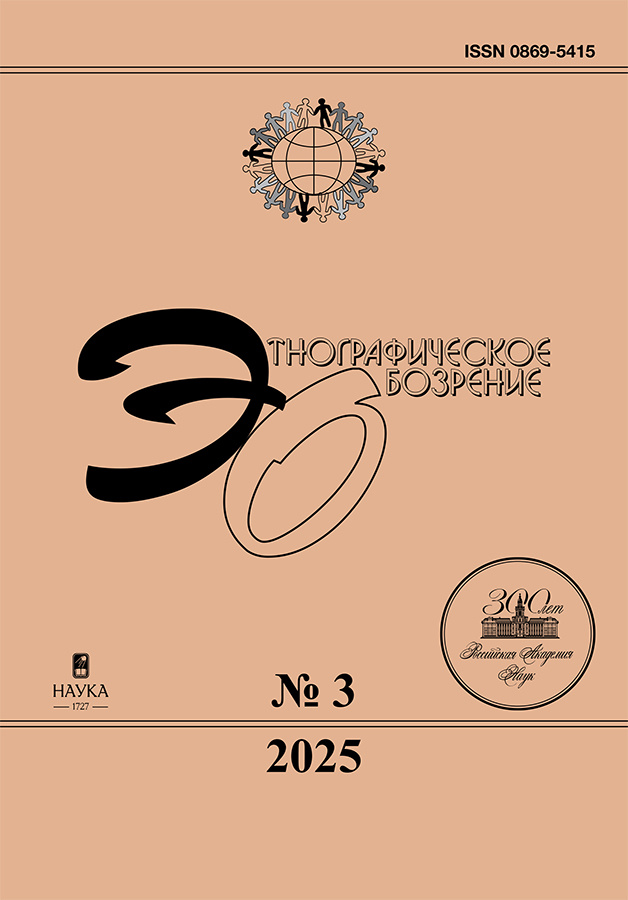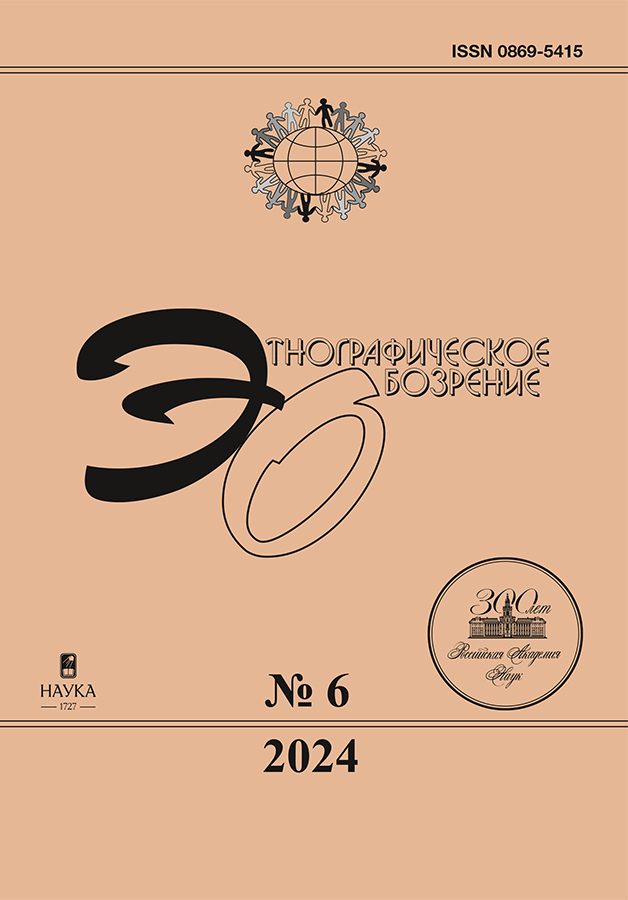Northern Fishing and Manuel DeLanda’s Flat Ontology
- Authors: Sokolovsky S.V.1, Goncharov N.S.2, Kuznetsov A.G.3,4, Kotkin K.Y.5,6,7, Sergeev A.M.5,8, Voronov V.V.5, Simonova V.V.5,9,10,11
-
Affiliations:
- Institute of Ethnology and Anthropology of the Russian Academy of Sciences
- Peter the Great Museum of Anthropology and Ethnography (Kunstkamera) of the Russian Academy of Sciences
- Yerevan Center for Internation Education (YCIE)
- European University at Saint Petersburg
- Murmansk Arctic University
- Murmansk Regional Museum
- Centre of Arctic and Siberian Exploration of the Sociological Institute Russian Academy of Sciences – a Branch of Federal Center for Theoretical and Applied Sociology of the Sociological Institute Russian Academy of Sciences
- Saint Petersburg State University
- Centre of Arctic and Siberian Exploration of the Sociological Institute of the Russian Academy of Sciences – a Branch of Federal Center for Theoretical and Applied Sociology of the Russian Academy of Sciences
- Academy of Sciences of the Republic of Sakha
- Higher School of Economics – Saint Petersburg Branch
- Issue: No 6 (2024)
- Pages: 175-199
- Section: Discussion: Assemblage Theories in Empirical Analyses
- URL: https://kld-journal.fedlab.ru/0869-5415/article/view/672390
- DOI: https://doi.org/10.31857/S0869541524060092
- EDN: https://elibrary.ru/VTDLSO
- ID: 672390
Cite item
Abstract
This publication presents a discussion of the article “Elements of Assemblage in Northern Informal Fisheries: Solidarity, Norms, Pink Salmon, Atlantic Salmon”, in which the authors (K.Y. Kotkin, A.M. Sergeev, V.M. Voronov, and V.V. Simonova) approach informal fisheries in the Murmansk region, employing Manuel DeLanda’s concept of horizontal ontology as an alternative to the traditional vertical structures that advocate a hierarchical understanding of the world and the exclusivity of humans. The authors argue that DeLanda’s horizontal ontology allows considering different-level components of fishing in two interdependent axes (“material – expressive” and “synthetic – variable”), and that the analysis of these axes lets us analyze the problem of the lack of positive attitude of local population toward the abundance of pink salmon, which is one of the most significant material components of the assemblage of informal fisheries in the Murmansk region. The discussion includes critical contributions: “Academic Fashion as a Conceptual Bricolage” (S.V. Sokolovskiy), “On Fish and Assemblages in the Murmansk Region” (N.S. Goncharov), and “DeLanda ‘Eats’ Salmon: The Kidnapping of Anthropology by a Supposedly ‘New’ Social Ontology” (A.G. Kuznetsov), as well as the response of the authors of the original article (“Figures and Background, or on the Logic of the Growth of Reviews”).
Full Text
About the authors
Sergey V. Sokolovsky
Institute of Ethnology and Anthropology of the Russian Academy of Sciences
Author for correspondence.
Email: sokolovskiserg@gmail.com
ORCID iD: 0000-0002-0112-0739
д. и. н., главный научный сотрудник
Russian Federation, MoscowNikolay S. Goncharov
Peter the Great Museum of Anthropology and Ethnography (Kunstkamera) of the Russian Academy of Sciences
Email: nikola.gon4arov@yandex.ru
ORCID iD: 0000-0003-0755-4877
к. и. н., научный сотрудник отдела этнографии Сибири
Russian Federation, Saint PetersburgAndrey G. Kuznetsov
Yerevan Center for Internation Education (YCIE); European University at Saint Petersburg
Email: andrey.kuznetsov.29@gmail.com
ORCID iD: 0000-0002-0249-5890
к. социол. н., научный сотрудник; ассоциированный научный сотрудник Центра исследований наук и технологий (STS-Центр)
Armenia, Yerevan; Saint Petersburg, RussiaKonstantin Ya. Kotkin
Murmansk Arctic University; Murmansk Regional Museum; Centre of Arctic and Siberian Exploration of the Sociological Institute Russian Academy of Sciences – a Branch of Federal Center for Theoretical and Applied Sociology of the Sociological Institute Russian Academy of Sciences
Email: kostyakotkin@rambler.ru
ORCID iD: 0000-0002-3281-3036
к. филос. н.; хранитель музейных предметов; ассоциированный научный сотрудник
Russian Federation, Murmansk; Murmansk; Saint PetersburgAndrey M. Sergeev
Murmansk Arctic University; Saint Petersburg State University
Email: asergeev8@yandex.ru
ORCID iD: 0000-0002-1553-4238
д. филос. н., ведущий научный сотрудник кафедры философии и социальных наук; профессор кафедры философской антропологии
Russian Federation, Murmansk; Saint PetersburgVasily V. Voronov
Murmansk Arctic University
Email: voronov.mspu@rambler.ru
ORCID iD: 0000-0002-3109-3655
к. филос. н., старший научный сотрудник кафедры философии и социальных наук
Russian Federation, MurmanskVeronika V. Simonova
Murmansk Arctic University; Centre of Arctic and Siberian Exploration of the Sociological Institute of the Russian Academy of Sciences – a Branch of Federal Center for Theoretical and Applied Sociology of the Russian Academy of Sciences; Academy of Sciences of the Republic of Sakha; Higher School of Economics – Saint Petersburg Branch
Email: v.simonova@socinst.ru
ORCID iD: 0000-0003-1167-7589
к. социол. н., PhD in Social Anthropology; руководитель
Russian Federation, Murmansk; Saint Petersburg; Yakutsk; Saint PetersburgReferences
- Bakshtankii, E.L. 1970. Skat molodi gorbushi i kety и prichiny ego zaderzhki v rekakh Kol’skogo poluostrova [The Migration of Juvenile Pink Salmon and Chum Salmon and the Reasons for Its Delay in the Rivers of the Kola Peninsula]. Trudy VNII morskogo rybnogo khoziaistva i okeanografii LXXIV: 129–143.
- Bennet, J. 2018. Pulsiruiushchaia materia. Politicheskaia ekologia veshchei [Vibrant Matter: A Political Ecology of Things]. Perm’: HylePress.
- DeLanda, M. 2002. Intensive Science and Virtual Philosophy. New York: Continuum.
- DeLanda, M. 2006. A New Philosophy of Society: Assemblage Theory and Social Complexity. London: Bloomsbury.
- DeLanda, M. 2016. Assemblage Theory. Edinburgh: Edinburgh University Press.
- DeLanda, M. 2018. Novaia filosofia obshchestva: teoria assambliazhei i sotsialnaia slozhnost’ [A New Philosophy of Society: Assemblage Theory and Social Complexity], translated by K.S. Maiorova; edited by. D. Viatkin, A. Morozov, and Y. Tsyrlina. Perm’: HylePress.
- Deleuze, G., and F. Guattari. 1994. What is Philosophy? New York: Columbia University Press.
- Durkheim, E. 1995. Metod sotsiologii [The Method of Sociology]. In Sotsiologiia. Ee predmet, metod, prednaznachenie [Sociology: Its Subject, Method, Purpose], by E. Durkheim, 5–165. Moscow: Kanon.
- Goncharov, N.S. 2020. Konteksty ispol’zovania pishchevykh narrativov na r. Indigirke [Contexts of Using Food Narratives on Indigirka River]. Sibirskie istoricheskie issledovania 3: 195–217.
- Gorelov, V.K. 2000. Nekotorye teoreticheskie i prakticheskie aspekty akklimatizatsii vodnykh organizmov [Some Theoretical and Practical Aspects of Acclimatization of Aquatic Organisms]. In Vidy-vselentsy v evropeiskikh moriakh Rossii [Invasive Species in the European Seas of Russia], edited by G.G. Matishov, 23–34. Apatity: KNTs RAN.
- Harman, G. 2017. Seti i assambliazhi: vozrozhdenie veshchei u Latura i Delanda [Networks and Assemblages: The Rebirth of Things in Latour and Delanda]. Logos 3 (27): 1–34.
- Ingold, T. 2022. Imagining for Real: Essays on Creation, Attention and Correspondence. Abingdon: Routledge.
- Krasavin, I.V. 2019. Ustroistvo sborki, ili Simuliatsia ontologii u Manuela Delanda [Assemblage Arrangement, or Manuel DeLanda’s Simulation of Ontology]. Sotsiologia vlasti 2 (31): 136–154.
- Loenko, A.A., et al. 2000. Gorbusha v rekah Kol’skogo poluostrova [Pink Salmon in the Rivers of the Kola Peninsula]. In Vidy-vselentsy v evropeiskikh moriakh Rossii [Invasive Species in the European Seas of Russia], edited by G.G. Matishov, 258–269. Apatity: KNTs RAN.
- Matishov, G.G. 2000. Nekotoryye problemy morskoi biologii v sviazi s vseleniem novykh vidov [Some Problems of Marine Biology in Relation to the Introduction of New Species]. In Vidy-vselentsy v evropeiskikh moriakh Rossii [Invasive Species in the European Seas of Russia], edited by G.G. Matishov, 7–12. Apatity: KNTs RAN.
- Meillassoux, Q. 2006. Après la Finitude. Essai sur la Nécessite de la Contingence [After Finitude: Ana Essay on the Necessity of Contingency]. Paris: Seuil.
- Shaviro, S. 2007. DeLanda, A New Philosophy of Society. In The Pinocchio Theory. 15.01.2007. http://www.shaviro.com/Blog/?p=541
- Shevchenko, V. 2020. Chto ne tak s teoriei assambliazhei? [What’s Wrong with Assemblage Theory?]. Logos 5 (30): 131–164.
- Tsing, A.L. 2017. Grib na kraiu sveta. O vozmozhnosti zhizni na ruinah kapitalizma [The Mushroom at the End of the World: On the Possibility of Life in Capitalist Ruins]. Moscow: Ad Marginem Press.
- Yates-Doerr, E. 2015. Does Meat Come from Animals? A Multispecies Approach to Classification and Belonging in Highland Guatemala. American Ethnologist 2 (42): 309–323.
- Zubchenko, A.V., et al. 2022. Novye dannye o biologii i chislennosti gorbushi Oncorhynchus gorbuscha (Walbaum) v vodoiomakh Kol’skogo poluostrova [New Data on the Biology and numbers of Pink Salmon Oncorhynchus gorbuscha (Walbaum) in Rivers of the Kola Peninsula]. In Vodnye biologicheskie resursy Rossii: sostoianie, monitoring, upravlenie. Sbornik materialov II Vserossiiskoi nauchnoi konferentsii, posviashchennoi 90-letiiu Kamchatskogo filiala Vserossiiskogo NII rybnogo khoziaistva i okeanografii (4–6 aprelia 2022 g., Petropavlovsk-Kamchatskii) [Aquatic Biological Resources of Russia: Status, Monitoring, Management], 21–26. Petropavlovsk-Kamchtskii: KamchatNIRO.
Supplementary files











